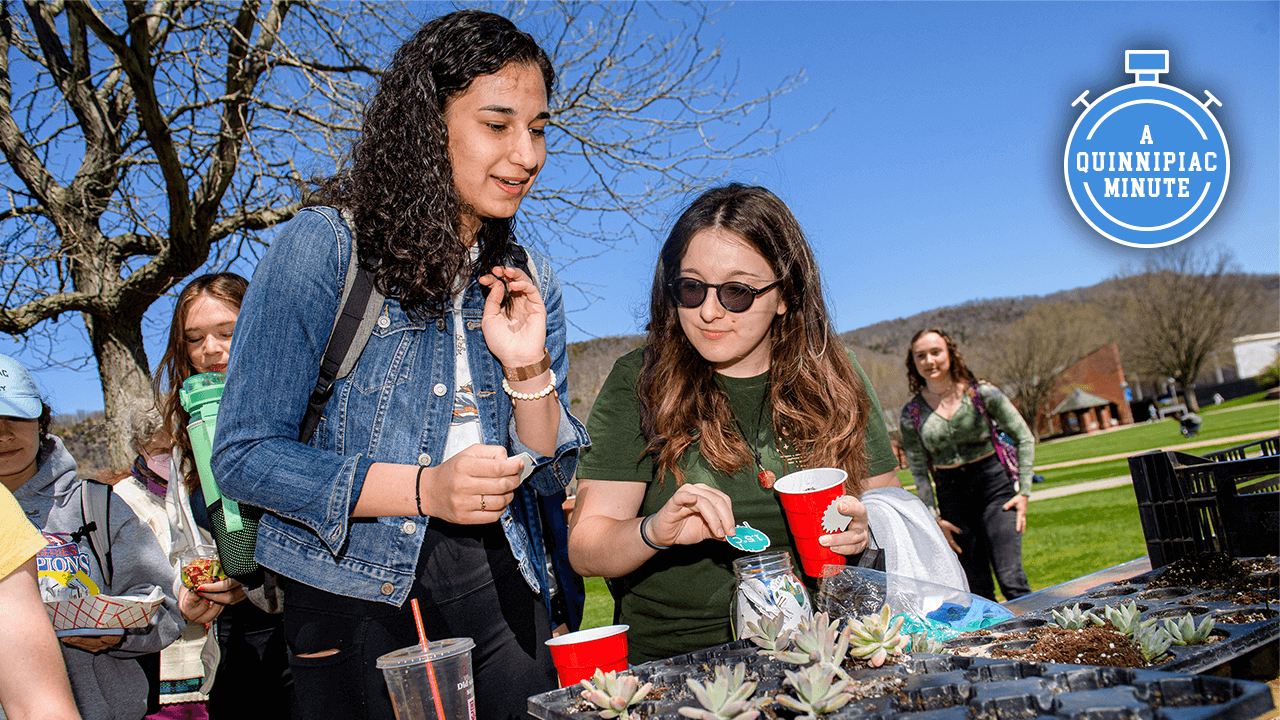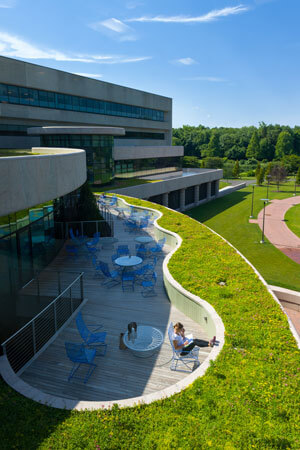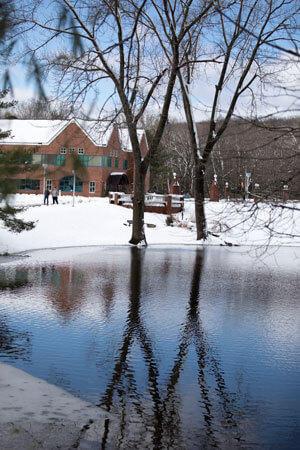Vision and Goals
A vision and goals for what sustainability means for Quinnipiac, the University of the Future



Strategic Plan
With direction from across the Quinnipiac community, the sustainability committee settled on a vision and framework that defines sustainability in three thematic and strategic areas: learning, living and leading.
We envision a Quinnipiac that is a model for sustainability in Southern New England, building its practices and leveraging its campuses to promote a healthy regional ecosystem, and to engage in practices that equip current and future students, faculty and staff to embody sustainable practices in their personal and professional lives, equipping them to thrive in a world increasingly influenced and affected by environmental disruption.
The Sustainability Committee, with membership drawn from administration, faculty, staff and students, aims to provide:
A vision and goals for what sustainability means for Quinnipiac, the University of the Future
Strategies that promote the most efficient and responsible use of resources in all of our operations to enhance sustainability
Opportunities to integrate principles of sustainability across the academic curriculum
Approaches to embed sustainable practices into the daily experiences of students, faculty and staff
Metrics that enable measurement of progress against the university’s sustainability vision and goals


Environmental justice is grounded in the belief that all people have the right to a clean and healthy environment, irrespective of race, gender, income, ethnicity or educational level. Studies have demonstrated that low-income communities of color disproportionately bear the health and livelihood burdens of environmental destruction and decline. Thus, environmental sustainability is not separate from racial justice: Black, indigenous and people of color are affected by environmental racism, in addition climate-related disasters disproportionately affect these same marginalized communities.
The university’s 10-point Plan for Racial Justice lays out an ambitious agenda for institutional strengthening. As we work to advance racial justice through this plan of action, we must work equally hard to advance environmental equity and justice into our identity and actions locally, regionally and globally — advocating for both our planet and our people. Ensuring an environment that meets present and future needs inevitably requires adjustments to the social and economic systems that depend upon and impact that environment. Quinnipiac will work to advance ecological learning, living and leading while remaining cognizant of the implications for the social and economic systems in which we are embedded.
In Fall 2018, the Intergovernmental Panel on Climate Change (IPCC) released a highly publicized special report on climate change that delves into the differential impact between warming of 2.0 degrees and warming of 1.5 degrees centigrade above pre-industrial levels. The major takeaway from this report is that the extra half degree of warming would have a significantly more severe impact on the earth systems we rely upon as a species for maintaining an inhabitable climate, a steady and predictable food supply, diversity of land and ocean species and security for human settlements given extreme weather and sea level rise.
“Climate-related risks to health, livelihoods, food security, water supply, human security, and economic growth are projected to increase with global warming of 1.5°C and increase further with 2°C” (IPCC 2018, headline statements).
Moreover, the window is very rapidly closing where action can be taken to keep us within even this more dangerous 2.0-degree rise.
We envision a world where Quinnipiac students, faculty, staff and alumni are agents of sustainability for the communities they engage and enrich — locally and beyond. To accomplish this, QU promotes a culture where students gain and develop an understanding of environmental sustainability appropriate to their majors. Students learn about complex connections among natural environments, built infrastructure, and social and cultural institutions. Learning occurs within the curriculum and through engagement in co- and extra-curricular activities.
We are currently proceeding on three fronts:
Conducting audits of:
Our faculty members’ expertise related to sustainability
Current environmental initiatives
Campus culture
Curriculum
Building curricular and co-curricular elements, by:
Implementing our three new majors
Developing new courses for the University Curriculum
Establishing an eco-rep program
Setting targets to:
Establish an environmental Essential Learning Outcome (ELO)
Integrate sustainability as a theme throughout all co- and extra-curricular programs and activities


In both physical presence and action, Quinnipiac serves as a responsible steward of its natural resources and supports the long-term environmental sustainability of humanity on Earth. QU community members live and engage in sustainable practices, contributing to the creation of a more resilient and environmentally sustainable campus and community.
We currently work to:
Measure:
Waste and energy flows
Water consumption
Transportation options
The use of plastic on campus
Implement:
Recycling education
Food recovery programs
Increased access to existing campus and regional transit services
Water conservation in our landscaping efforts
Programs promoting mindful conservation practices
Envision:
Targeted reductions of single-use plastics
Alternatives to single-occupancy vehicles
A flagship sustainable facility on campus


The presence of environmental sustainability in all pertinent practices is a central value at Quinnipiac. This value permeates our administrative and operational structures and provides the basis for external communication and internal execution of sustainable practices.
To better lead in sustainability on and off campus, we are:
Hiring an in-house environmental health and safety officer
Researching appropriate institutional memberships
Developing and implementing comprehensive monitoring and reporting systems
Working toward the full establishment of an Office of Sustainability with a Chief Sustainability Officer


Beginning 2021
Conduct audits: curriculum, energy use, water/waste/plastic*
Pursue institutional membership • Initiate monitoring system/dashboard*
Hire environmental health & safety officer
Build curricular and co-curricular elements: major, UC, eco-rep program*
Implement water conservation, transport options, food & waste stream efficiencies*
Establish Office of Sustainability with Chief Sustainability Officer*
Seek institutional recognition/certification
Reduce single-use plastics on campus*
Build a flagship sustainable building*
Establish an environmental Essential Learning Outcome (ELO) & begin reporting educational outcomes*
Sustainability has different meanings to different people and communities. Quinnipiac follows the definition promoted by the United Nations World Commission on Environment and Development: that environmental sustainability entails the ability to meet the needs of the present without compromising the ability of future generations to meet their own needs. At the same time, current visions of sustainable development recognize the deep connections between environmental preservation, economic health and social justice.
Consistent with the university’s Strategic Plan, our community advances environmental sustainability by being a model steward of our own natural resources and by educating our students, faculty and staff to be proactive in their efforts to advance sustainability in their professional and personal lives. We partner with local and regional communities to achieve outcomes that support the long-term sustainability of our larger culture, in a way that recognizes and seeks to eliminate existing barriers to full participation in and enjoyment of the environment for all members of the community.
We envision a Quinnipiac that is a model for sustainability in Southern New England. In communication and collaboration with other area universities, it promotes a sustainable transportation infrastructure, leverages its campuses to promote a healthy regional ecosystem, and engages in practices that demonstrate to current and future students, faculty and staff work environments, lifestyles and practices that will help to reverse decades of environmental harm, prepare to weather the effects of climate disruption, and promote an ethic of care for and repair of natural systems.
We'd love to hear your feedback or suggestions. Contact us at qusustainability@qu.edu